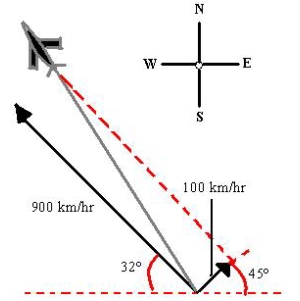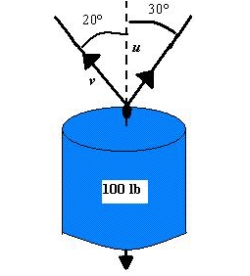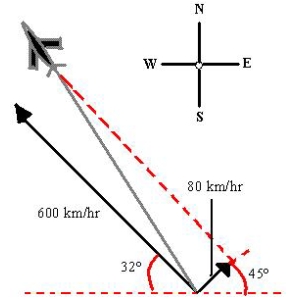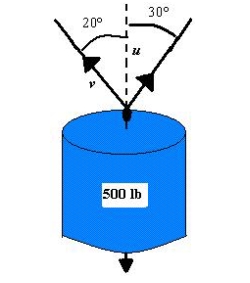Deck 11: Section 1: Vectors and the Geometry of Space
سؤال
سؤال
سؤال
سؤال
سؤال
سؤال
سؤال
سؤال
سؤال
سؤال
سؤال
سؤال
سؤال
سؤال
سؤال
سؤال
سؤال
سؤال
سؤال
سؤال

فتح الحزمة
قم بالتسجيل لفتح البطاقات في هذه المجموعة!
Unlock Deck
Unlock Deck
1/20
العب
ملء الشاشة (f)
Deck 11: Section 1: Vectors and the Geometry of Space
1
Suppose a plane flies at a constant groundspeed of 500 miles per hour due east and encounters a 50 mile-per-hour wind from the northwest. Both the airspeed and the compass direction must change to for the plane to maintain its groundspeed and eastward direction. Find the airspeed to maintain its groundspeed and eastward direction. Round your answer to two decimal places.
A)
B)
C)
D)
E)
A)

B)

C)

D)

E)


2
Suppose a plane is flying in the direction  . Its speed with respect to the air is 900 kilometers per hour. The wind at the plane's altitude is from the southwest at 100 kilometers per hour (see figure). What is the true direction of the plane? Round your answer to two decimal places.
. Its speed with respect to the air is 900 kilometers per hour. The wind at the plane's altitude is from the southwest at 100 kilometers per hour (see figure). What is the true direction of the plane? Round your answer to two decimal places. 
A)
B)
C)
D)
E)
 . Its speed with respect to the air is 900 kilometers per hour. The wind at the plane's altitude is from the southwest at 100 kilometers per hour (see figure). What is the true direction of the plane? Round your answer to two decimal places.
. Its speed with respect to the air is 900 kilometers per hour. The wind at the plane's altitude is from the southwest at 100 kilometers per hour (see figure). What is the true direction of the plane? Round your answer to two decimal places. 
A)

B)

C)

D)

E)


3
Given  and
and  , find
, find  .
.
A)
B)
C)
D)
E)
 and
and  , find
, find  .
.A)

B)

C)

D)

E)


4
Find the unit vector in the direction of u. 
A)
B)
C)
D)
E)

A)

B)

C)

D)

E)


فتح الحزمة
افتح القفل للوصول البطاقات البالغ عددها 20 في هذه المجموعة.
فتح الحزمة
k this deck
5
Find the vector v with the given magnitude ||v|| = 185 and the same direction as  .
.
A)
 ,
, 

B)
 ,
, 


C)

 ,
, 

D)
 ,
, 

E)
 ,
, 

 .
.A)

 ,
, 

B)

 ,
, 


C)


 ,
, 

D)

 ,
, 

E)

 ,
, 


فتح الحزمة
افتح القفل للوصول البطاقات البالغ عددها 20 في هذه المجموعة.
فتح الحزمة
k this deck
6
Find the component form of vector v given its magnitude is  and the angle it makes with the positive x-axis is
and the angle it makes with the positive x-axis is  .
.
A)
B)
C)
D)
E)
 and the angle it makes with the positive x-axis is
and the angle it makes with the positive x-axis is  .
.A)

B)

C)

D)

E)


فتح الحزمة
افتح القفل للوصول البطاقات البالغ عددها 20 في هذه المجموعة.
فتح الحزمة
k this deck
7
Find the magnitude of the vector given below. Round your answer to four decimal places. 
A)
B)
C)
D)
E)

A)

B)

C)

D)

E)


فتح الحزمة
افتح القفل للوصول البطاقات البالغ عددها 20 في هذه المجموعة.
فتح الحزمة
k this deck
8
To carry a 100-pound cylindrical weight, two workers lift on the ends of short ropes tied to an eyelet on the top center of the cylinder. One rope makes a  angle away from the vertical and the other makes a
angle away from the vertical and the other makes a  angle as shown in the figure below. Find each rope's tension if the resultant force is vertical.Round your answer to two decimal places.
angle as shown in the figure below. Find each rope's tension if the resultant force is vertical.Round your answer to two decimal places. 
A)
B)
C)
D)
E)
 angle away from the vertical and the other makes a
angle away from the vertical and the other makes a  angle as shown in the figure below. Find each rope's tension if the resultant force is vertical.Round your answer to two decimal places.
angle as shown in the figure below. Find each rope's tension if the resultant force is vertical.Round your answer to two decimal places. 
A)

B)

C)

D)

E)


فتح الحزمة
افتح القفل للوصول البطاقات البالغ عددها 20 في هذه المجموعة.
فتح الحزمة
k this deck
9
Suppose a plane is flying in the direction  (relative to the west). Its speed with respect to the air is 600 kilometers per hour. The wind at the plane's altitude is from the southwest at 80 kilometers per hour (see figure). What is its speed with respect to the ground? Round your answer to one decimal place.
(relative to the west). Its speed with respect to the air is 600 kilometers per hour. The wind at the plane's altitude is from the southwest at 80 kilometers per hour (see figure). What is its speed with respect to the ground? Round your answer to one decimal place. 
A)
B)
C)
D)
E)
 (relative to the west). Its speed with respect to the air is 600 kilometers per hour. The wind at the plane's altitude is from the southwest at 80 kilometers per hour (see figure). What is its speed with respect to the ground? Round your answer to one decimal place.
(relative to the west). Its speed with respect to the air is 600 kilometers per hour. The wind at the plane's altitude is from the southwest at 80 kilometers per hour (see figure). What is its speed with respect to the ground? Round your answer to one decimal place. 
A)

B)

C)

D)

E)


فتح الحزمة
افتح القفل للوصول البطاقات البالغ عددها 20 في هذه المجموعة.
فتح الحزمة
k this deck
10
To carry a 500-pound cylindrical weight, two workers lift on the ends of short ropes tied to an eyelet on the top center of the cylinder. One rope makes a  angle away from the vertical and the other makes a
angle away from the vertical and the other makes a  angle as shown in the figure below. Find the vertical component of each worker's force. Round your answer to two decimal places.
angle as shown in the figure below. Find the vertical component of each worker's force. Round your answer to two decimal places. 
A)
B)
C)
D)
E)
 angle away from the vertical and the other makes a
angle away from the vertical and the other makes a  angle as shown in the figure below. Find the vertical component of each worker's force. Round your answer to two decimal places.
angle as shown in the figure below. Find the vertical component of each worker's force. Round your answer to two decimal places. 
A)

B)

C)

D)

E)


فتح الحزمة
افتح القفل للوصول البطاقات البالغ عددها 20 في هذه المجموعة.
فتح الحزمة
k this deck
11
Find the component form of vector u + v given  and
and  and the angles that u and v make with the positive x-axis are
and the angles that u and v make with the positive x-axis are  and
and  .
.
A)
B)
C)
D)
E)
 and
and  and the angles that u and v make with the positive x-axis are
and the angles that u and v make with the positive x-axis are  and
and  .
.A)

B)

C)

D)

E)


فتح الحزمة
افتح القفل للوصول البطاقات البالغ عددها 20 في هذه المجموعة.
فتح الحزمة
k this deck
12
Three forces with magnitudes  pounds,
pounds,  pounds and
pounds and  pounds act on an object at angles
pounds act on an object at angles  ,
,  , and
, and  respectively, with the positive x-axis. Find the direction and magnitude of the resultant force. (The choices below are given to two decimal places.)
respectively, with the positive x-axis. Find the direction and magnitude of the resultant force. (The choices below are given to two decimal places.)
A) with the positive x-axis
with the positive x-axis
B) with the positive x-axis
with the positive x-axis
C) with the positive x-axis
with the positive x-axis
D) with the positive x-axis
with the positive x-axis
E) pounds at an angle of
pounds at an angle of  with the positive x-axis
with the positive x-axis
 pounds,
pounds,  pounds and
pounds and  pounds act on an object at angles
pounds act on an object at angles  ,
,  , and
, and  respectively, with the positive x-axis. Find the direction and magnitude of the resultant force. (The choices below are given to two decimal places.)
respectively, with the positive x-axis. Find the direction and magnitude of the resultant force. (The choices below are given to two decimal places.)A)
 with the positive x-axis
with the positive x-axisB)
 with the positive x-axis
with the positive x-axisC)
 with the positive x-axis
with the positive x-axisD)
 with the positive x-axis
with the positive x-axisE)
 pounds at an angle of
pounds at an angle of  with the positive x-axis
with the positive x-axis
فتح الحزمة
افتح القفل للوصول البطاقات البالغ عددها 20 في هذه المجموعة.
فتح الحزمة
k this deck
13
Find vectors u and v whose initial and terminal points are given. Determine whether u and v are equivalent. u: (6,5), (9,11) v: (3,-5), (6,1)
A)
B)
C)
D)
E)
A)

B)

C)

D)

E)


فتح الحزمة
افتح القفل للوصول البطاقات البالغ عددها 20 في هذه المجموعة.
فتح الحزمة
k this deck
14
The vector v and its initial point is given. Find the terminal point.  , initial point
, initial point 
A)
B)
C)
D)
E)
 , initial point
, initial point 
A)

B)

C)

D)

E)


فتح الحزمة
افتح القفل للوصول البطاقات البالغ عددها 20 في هذه المجموعة.
فتح الحزمة
k this deck
15
Find the vector v whose initial and terminal points are given below. (5,5), (7,2)
A)
B)
C)
D)
E)
A)

B)

C)

D)

E)


فتح الحزمة
افتح القفل للوصول البطاقات البالغ عددها 20 في هذه المجموعة.
فتح الحزمة
k this deck
16
Suppose a gun with a muzzle velocity of 1200 feet per second is fired at an angle of  above the horizontal. Find the horizontal component of the velocity. Round your answer to two decimal places.
above the horizontal. Find the horizontal component of the velocity. Round your answer to two decimal places.
A) ft/sec
ft/sec
B) ft/sec
ft/sec
C) ft/sec
ft/sec
D) ft/sec
ft/sec
E) ft/sec
ft/sec
 above the horizontal. Find the horizontal component of the velocity. Round your answer to two decimal places.
above the horizontal. Find the horizontal component of the velocity. Round your answer to two decimal places.A)
 ft/sec
ft/secB)
 ft/sec
ft/secC)
 ft/sec
ft/secD)
 ft/sec
ft/secE)
 ft/sec
ft/sec
فتح الحزمة
افتح القفل للوصول البطاقات البالغ عددها 20 في هذه المجموعة.
فتح الحزمة
k this deck
17
Find the vector v whose initial and terminal points are given below. (5.5,2.1), (9.5, 6.1)
A)
B)
C)
D)
E)
A)

B)

C)

D)

E)


فتح الحزمة
افتح القفل للوصول البطاقات البالغ عددها 20 في هذه المجموعة.
فتح الحزمة
k this deck
18
Suppose a plane flies at a constant groundspeed of 600 miles per hour due east and encounters a 10 mile-per-hour wind from the northwest. Both the airspeed and the compass direction must change to for the plane to maintain its groundspeed and eastward direction. Find the airspeed to maintain its groundspeed and eastward direction. Round your answer to two decimal places.
A)
B)
C)
D)
E)
A)

B)

C)

D)

E)


فتح الحزمة
افتح القفل للوصول البطاقات البالغ عددها 20 في هذه المجموعة.
فتح الحزمة
k this deck
19
Given  and
and  , find
, find  .
.
A)
B)
C)
D)
E)
 and
and  , find
, find  .
.A)

B)

C)

D)

E)


فتح الحزمة
افتح القفل للوصول البطاقات البالغ عددها 20 في هذه المجموعة.
فتح الحزمة
k this deck
20
Given  , find
, find  .
.
A)
B)
C)
D)
E)
 , find
, find  .
.A)

B)

C)

D)

E)


فتح الحزمة
افتح القفل للوصول البطاقات البالغ عددها 20 في هذه المجموعة.
فتح الحزمة
k this deck








